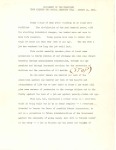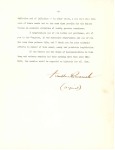You are currently browsing the monthly archive for August 2010.
August 31, 1935: FDR signs the Tennessee Valley Act which creates the Tennessee Valley Authority to oversee navigation, flood control, electrical production and economic development in the Tennessee Valley.
TVA: The sole water supply of this section of Wilder, Tennessee
FDR Library Photo Collection. NPx. 52-333.
August 23, 1955
“TOKYO, Aug. 23—The other morning we went to the big fish market, which is really quite a sight. There were enormous pieces of tuna fish, fascinating green crabs and more fish of every size, shape and description than I have ever seen. They hold an auction early in the morning for the big retailers of fish. After this the public can walk through the aisles or booths and buy what they want or go to the little shops in the neighboring streets where the price might be a little more but still would be moderate. I saw a man sweeping up small pieces of fish from the floor in the big market that had dropped from the stands, and Mrs. Matsumoto said that he probably took those scraps and sold them in a cheap market for poor people. This seemed to me rather appalling and certainly not very sanitary.
When we left the market we visited a cultured-pearl merchant where we saw an infinite variety of pearls and tried to tell the difference between them. I finally decided that the value of a pearl depends on what an individual personally likes. I was told that pearls with a pink luster had been the most popular pearls until recently, now gray ones were more in vogue. However, my preference is still for ones with the pinkish color.
We lunched at International House and I was glad to see some of my friends who helped to plan my activities when I was here two years ago. Later we went to the museum and saw some interesting archeological finds dating back to the sixth century B.C., most of which were found in burial mounds. We also had a glimpse of lovely textiles and then saw some screens and drawings of a later period. We dined in the evening with our ambassador, Mr. John M. Allison, and his wife, and I asked the ambassador some of the questions I had put to my Japanese friends at luncheon. I was glad to find that he felt much the way they did on the subject of Japanese reactions to America.”
August 18, 1938: FDR receives and honorary degree of doctor of civil laws at Queen’s University, Kingston, Ontario, Canada.
- Reading copy of Queen’s University Address, pg 1.
- Pg. 2
- Pg. 3
- Pg. 4
- Pg. 5
- Pg. 6
- Pg. 7
August 19, 1939
“HYDE PARK, Friday—…I have noticed some comment in the newspapers on the change of the Thanksgiving Day date and today I get a most amusing letter attributing this change to a desire to help a certain race in this country, which is credited, in this note, with doing most of the “trading” and which, they say, is not interested in American traditions. Of course, I thought it was just Thanksgiving Day which was a tradition with us and not any particular date, for that has always varied. I think I can give thanks equally well a week before the last Thursday in November if that happens to make a slightly better division of the holiday season.
But, my dear man or woman, for you wrote to me anonymously, how about remembering how the Yankees were always good traders and perhaps some of them are still in the business? Thanksgiving Day is one of my favorite holidays, but I am not going to enter into any discussions over the date so long as we retain a day on which to count our blessings and gather our families together.”
August 10, 1944
“HYDE PARK, Wednesday—…Business is desperately important to us now. It should be given every legitimate help because we want the business enterprises of the country to continue to function at top production. We do not want this primarily, however, so that unlimited profits can be made on investments. We want the jobs which full production will bring us. We have to have those jobs because, unless the people have them, their standard of living will go down and they will not be able to buy the goods which full production will produce.
Small businesses have always provided a great many jobs, and it seems to me that both big businesses and the public should be interested in seeing small businesses get a break. It will take planning, of course, to see that these businesses are really profitable and really do the things that they do better than big business, but it will pay us in the long run.”
August 2, 1938
“PATCHOGUE, N.Y., Monday—…I’ve also read all of the report and some of the speeches made at the health conference, which was held at Washington during the third week of July. It seems to me that many points of view were presented but that it was perhaps too big a gathering for real discussion. I hope that before a five or ten year plan is adopted, we will all have our ultimate objectives clearly in mind.
To me there seem to be three main objectives.
First: we must make medical care available to the low income groups of the nation.
Second: we must not retard research. Our ignorance in many fields is only fully realized by those who know the most and for that reason are able to gauge how little they really know.
Third: We must demand that continuous education be available and obligatory for all doctors.
We may find that health insurance partially answers our first objective, but it cannot answer the others. There were speakers at the conference who seemed to feel that some system of insurance could be devised to give adequate medical care to all who need it in this country today. They forget, it seems to me, that health to some extent is a question of the education of every individual.
Also, medical care is no substitute for adequate food of the right kind, decent housing, a fair wage, and the type of education which will make a decent standard of living possible. It is one thing to realize that you need an emergency operation, but it is quite another to be willing to pay even a small amount for preventive care, or to be willing to take the trouble to do the things which will keep a family well.
No one plan goes forward alone and they all require an educated people willing to cooperate for the good of the whole people.”












